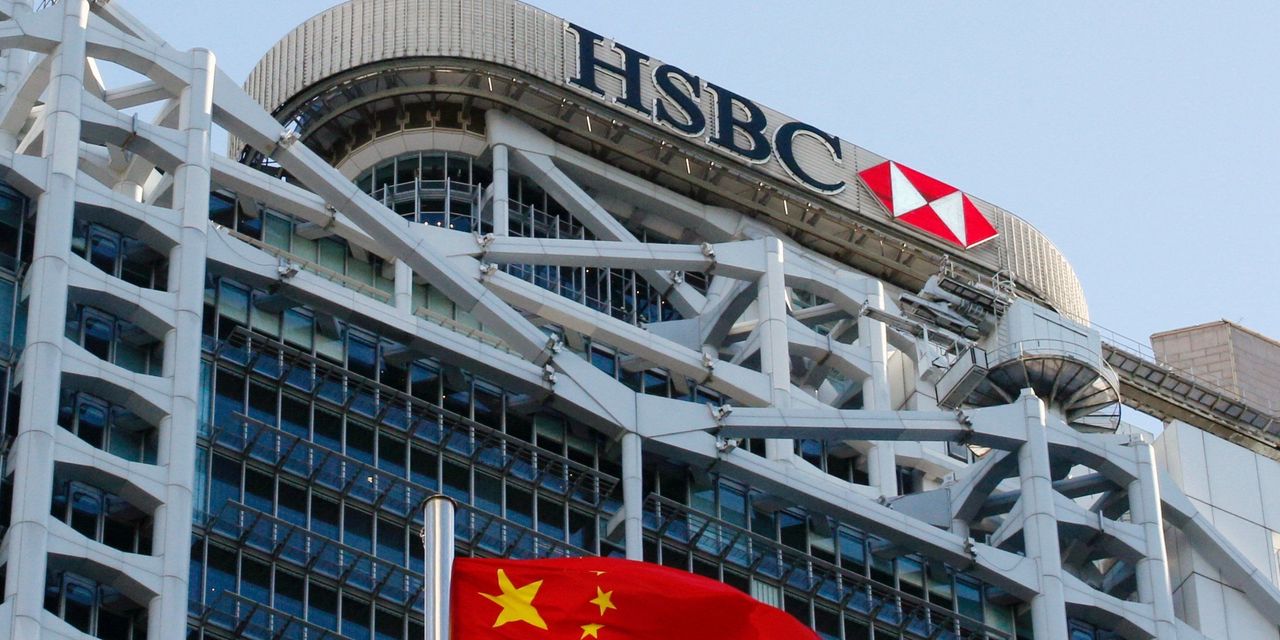

HSBC,
Europe’s most valuable bank, makes most of its money in Asia but is headquartered in the U.K. Now its largest shareholder, China’s
is pushing for strong measures to rectify this unwieldy arrangement—including a potential spinoff of the Asian business.
HSBC is involved in a major restructuring effort to tilt its business further toward Asia, which accounted for 65% of pretax profits in 2021. Slow progress toward this goal—and a share price that remains mired below prepandemic levels, in contrast to some sizable Asian rivals like Singapore’s DBS, might be one factor spurring demands for more radical action from Ping An, which owns about 8% of the company.
Lurking in the background, though, is geopolitics: As relations between China and Western democracies have deteriorated, HSBC increasingly has found itself in the crossfire. When the bank has acted to appease Hong Kong or mainland Chinese authorities, for example by expressing support for Hong Kong’s draconian national security law in 2020, it has run afoul of Western politicians. When it cooperated with the U.S. investigation of Huawei for sanctions-busting, Chinese state media went on the attack.
An arrangement less firmly in the no-man’s-land between West and East—or with different, separate positions on opposite sides of the trenches—thus has a certain logic. But if the goal is to insulate a Hong Kong based Asian HSBC from Western political risk, a split would be a partial solution at best and would do little to protect the new company from the thorniest issues involving current and possible future U.S. sanctions.
A split, if it does eventually materialize, might help with some of the more prosaic or small-scale regulatory issues the bank’s contorted East-West structure creates. Ping An was especially irked, according to a Financial Times report citing anonymous sources, by the dividend cut forced on HSBC during the pandemic by British regulators. A separate Asia-focused business headquartered in Hong Kong might have taken a different tack, given the pandemic’s less-devastating toll on most large East Asian economies and their different political constituencies.
Regarding the largest, hairiest elephant in the room, though—U.S. and European sanctions enforcement—a separate Asian business wouldn’t provide much cover. HSBC’s massive trade finance business and other cross-border operations remain heavily dependent on access to the global dollar system. Western governments have responded to Russia’s invasion of Ukraine by imposing tough restrictions on trade, including on high technology exports and imports of Russian oil. Any financial institutions breaching such sanctions—or, potentially, future sanctions on China in the event of an invasion of Taiwan—would risk being cut off from the dollar-payments system by U.S. regulators.
And while some recent events might chip away at the dollar’s dominance—i.e. Western moves to freeze Russian reserve assets—others could help cement it further. Weaker demand growth for yuan-denominated assets over the next several years seems likely as U.S. bond yields soar, Chinese growth faces rising cyclical and structural headwinds and China’s central bank acts to support its economy.
Two different HSBCs, both more directly beholden to different political constituencies, might find it easier to please some shareholders and defuse public-relations disasters of the more moderate variety. The biggest political risks, however, would remain.
Write to Nathaniel Taplin at nathaniel.taplin@wsj.com
Copyright ©2022 Dow Jones & Company, Inc. All Rights Reserved. 87990cbe856818d5eddac44c7b1cdeb8
Appeared in the May 6, 2022, print edition as ‘HSBC Split Won’t Fix Political Woes.’
24World Media does not take any responsibility of the information you see on this page. The content this page contains is from independent third-party content provider. If you have any concerns regarding the content, please free to write us here: contact@24worldmedia.com

Common Mistakes When Using Athletic Field Tarps

High-Performance Diesel Truck Upgrades You Should Consider

Warehouse Optimization Tips To Improve Performance

Fire Hazards in Daily Life: The Most Common Ignition Sources

Yellowstone’s Wolves: A Debate Over Their Role in the Park’s Ecosystem

Earth Day 2024: A Look at 3 Places Adapting Quickly to Fight Climate Change

Millions of Girls in Africa Will Miss HPV Shots After Merck Production Problem

This Lava Tube in Saudi Arabia Has Been a Human Refuge for 7,000 Years

Four Wild Ways to Save the Koala (That Just Might Work)

National Academy Asks Court to Strip Sackler Name From Endowment

Ways Industrial Copper Helps Energy Production

The Ins and Out of Industrial Conveyor Belts